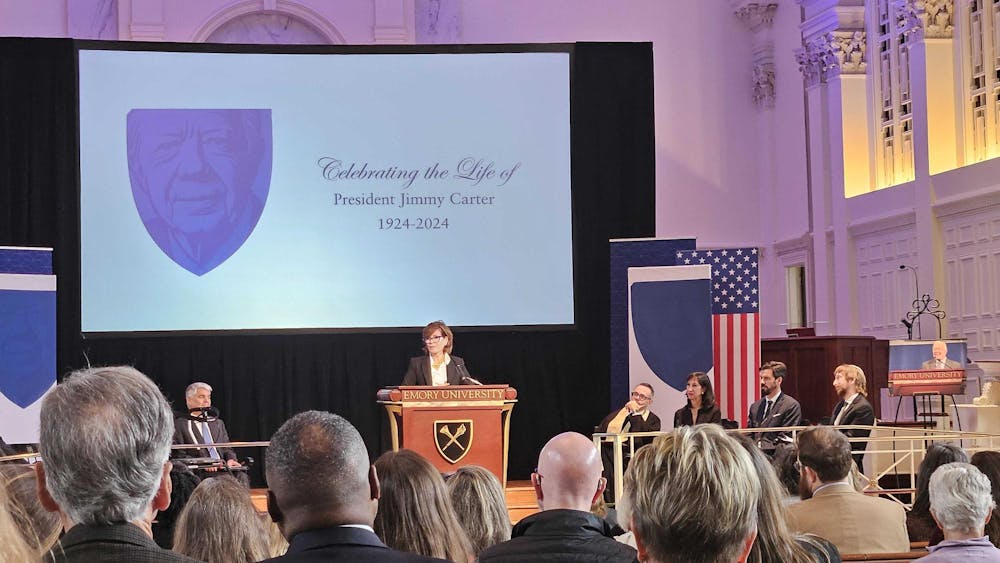Nearly 900 students, alumni, faculty and staff gathered at Glenn Memorial United Methodist Church and online on Feb. 10 to celebrate the life and legacy of former U.S. President Jimmy Carter, who died on Dec. 29, 2024. Carter served as an Emory University distinguished professor for 37 years before becoming a tenured professor in 2019.
Dean of Religious Life and University Chaplain Rev. Gregory McGonigle welcomed all attendees and introduced Carter by remarking on his “humility, integrity and an unshakeable faith in the goodness of humanity,” whether that be as a leader, humanitarian, father or friend. McGonigle encouraged the audience to treat the gathering not just as a memorial but as a celebration of a rich life devoted to service.
University President Gregory Fenves echoed his sentiment, describing Carter as a “humanitarian of grace and integrity” and commending his work at Emory, which includes co-founding The Carter Center and his role in aiding researchers to better understand and destigmatize mental illness.
“When he was asked ‘What does he want to be remembered for?’ [Carter said he would] ‘like to be remembered as a champion of human rights, as a president who kept our country at peace and as having been a distinguished professor at Emory University,’” Fenves said. “And to that request, President Carter, all I can say is, you will be.”
In a video message, former University President James Laney stated that Carter’s legacy in championing human rights will set him apart from other presidents even far into the future.
“A thousand years from now, the names of the United States presidents will be very few that are remembered, but yours will be one of them because of your role with human rights,” Laney said, addressing the late president directly.
Presidential Distinguished Professor Emeritus of International Health Dr. William Foege said that Carter fundamentally changed global health and the outcomes of many diseases, leaving a lasting impact on millions of people. Foege, who also served as the first executive director of The Carter Center and the director of the Centers for Disease Control and Prevention, spoke of Carter’s commitment to “neglected diseases,” almost all of which now have dedicated programs, according to Foege. Such diseases include river blindness and lymphatic filariasis.
Ariane Ngo Bea Hob (18PH), a senior technical coordinator at The Carter Center, thanked Carter in a video message for his valuable support in the continued effort to eliminate Guinea worm disease in Chad — an eradication campaign The Carter Center has led since 1986. Ngo Bea Hob said that animal cases dropped by 43% from 2023 to 2024, which she remarked was a “tremendous achievement.”
At Emory, Carter did not undervalue students simply because they were students, according to Jimmy Carter Professor of History Joseph Crespino. Crespino used to teach a seminar about Carter’s life, which culminated in students writing a final paper about their research on the former president. Carter would then come to the final class and answer questions from students about their research.
“It was amazing to see the seriousness with which he took the assignment and the humility,” Crespino said. “He was never just recycling old stories. He was always about answering students’ questions as earnestly and fully as he could.”
Crespino highlighted a particular interaction between Carter and a student at the time, Ami Fields-Meyer (16C), who pelted the former president with questions. Carter responded “patiently and firmly” and took the former student seriously. Fields-Meyer, now a senior fellow at the Ash Center for Democratic Governance and Innovation at the Harvard Kennedy School (Mass.), recently published a piece about how his past exchange with Carter transformed his outlook on peace.
Steven Wolf (72G, 73G), professor emeritus of rehabilitation medicine at the Emory School of Medicine, recalled an interaction with Carter that highlighted his down-to-earth nature.
“It was the honesty and simplicity with which he spoke to us,” Wolf said. “It’s not like ‘Here’s me, past president of the United States coming to talk to you.’ He was a professor, just wanted to meet some students. Never even introduced himself as a past president of the United States.”
Carter’s compassion and humble attitude were characteristics he embodied in his personal life as well.
Nurse Dorothy Jordan, Nell Hodgson Woodruff School of Nursing Blakes Scholars director and clinical associate professor, described how Carter stayed in touch after her late husband and Carter’s White House Chief of Staff, Hamilton Jordan, lost a decades-long battle with cancer. Carter would frequently call to check in on her, which always “shocked” her, and he continued to do so after Dorothy Jordan’s own cancer diagnosis
“He was not reaching out to me for any other reason other than he cared,” Dorothy Jordan said. “Like so many other people in the world who were lucky enough to be on the receiving end of President Carter’s compassion, my family was forever changed by his comments.”
Dorothy Jordan also expressed her gratitude for the community Carter built and left behind, and she is hopeful for the future, even “in the face of extraordinary local and national challenges.”
Associate Director of International Alumni Engagement Jennifer Mina Valencia (17C) appreciated how each speech at the event highlighted different areas of the former president’s life, whether professional or personal. Rev. Edith Woodling (72C, 24T), who assisted with Carter’s presidential campaign in Pittsburgh and attended his inauguration, shared this sentiment and described the event as a “beautiful tribute” to Carter and his wife.
“He was always so sincere,” Woodling said. “He was always himself. And he was, as so many people have said, he was the same way in public life as he was in private life.”









